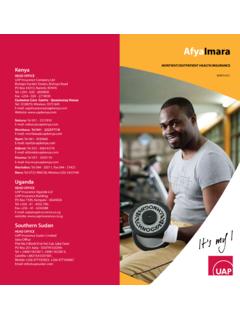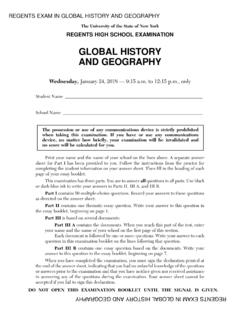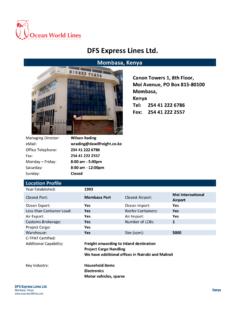Transcription of IN THE HIGH COURT OF SOUTH AFRICA - SAFLII Home
1 Republic of SOUTH AFRICA REPORTABLE IN THE high COURT OF SOUTH AFRICA (WESTERN CAPE DIVISION, CAPE TOWN) high COURT Review Number: 14172 Magistrate s COURT Serial Number: H20/2013 Case Number: A269/2013 In the matter between: THE STATE and DAVID KIRSCH SPECIAL REVIEW JUDGMENT DATED 19 FEBRUARY 2014 IN TERMS OF S 304(4) OF ACT 51 OF 1977 CLOETE J: [1] This matter came before me in chambers as a special review in terms of s 304(4) of the Criminal Procedure Act No 51 of 1977 ( the CPA ). [2] The accused, who was legally represented, was charged in the Paarl magistrate s COURT on 20 August 2013 on one count of contravening s 27(18) read with ss 1, 2 and 5(1) of the National Heritage Resources Act 25 of 1999, it 2 being alleged that he undertook construction work during June/July 2011 which did not comply with building plans approved by the heritage resources authority responsible for the protection of the site concerned.
2 [3] He pleaded not guilty and declined to provide a plea explanation in terms of s 115 of the CPA. [4] During the course of the evidence of the first state witness it emerged that the state would have to call a witness, Mr Johan Malherbe, who is a friend of the presiding magistrate, in addition to which Mr Malherbe s secretary is the magistrate s neighbour. The magistrate then adjourned the proceedings until the following morning in order to consider whether she should recuse herself therefrom. [5] Having regard to the requirements set out in S v Roberts 1999 (2) SACR 243 (SCA) at paras [32] to [33], which are referred to below, the magistrate formed the view that the accused might be suspicious, if convicted, that she had been biased against him.
3 On 21 August 2013 she informed the parties of the need for her to recuse herself and has referred the matter to this COURT for the proceedings to be set aside and for an order that the trial must commence de novo before another magistrate. There is a further difficulty in that a portion of the evidence in the COURT a quo was not recorded. [6] S 35(3) of the Constitution provides that an accused person has the right to a fair trial. In Roberts at para [26] the COURT stated that: 3 It is settled law that not only actual bias but also the appearance of bias disqualifies a judicial officer from presiding (or continuing to preside) over judicial proceedings.
4 The disqualification is so complete that continuing to preside after recusal should have occurred renders the further proceedings a [7] The requirements set out in Roberts are that: (a) there must be a suspicion that the judicial officer might, not would, be biased; (b) the suspicion must be that of a reasonable person in the position of the accused; (c) the suspicion must be based on reasonable grounds; and (d) the suspicion is one which a reasonable person would, not might, have. [8] In S v Malindi and Others 1990 (1) SA 962 AD at 969G-I the COURT stated the following: The common law basis of the duty of a judicial officer in certain circumstances to recuse himself was fully examined in the cases of S v Radebe 1973 (1) SA 796 (A) and SOUTH African Motor Acceptance Corporation (Edms) Bpk v Oberholzer 1974 (4) SA 808 (T).
5 Broadly speaking, the duty of recusal arises where it appears that the judicial officer has an interest in the case or where there is some other reasonable ground for believing that there is a likelihood of bias on the part of the judicial officer: that is, that he will not adjudicate impartially. The matter must be regarded from the point of view of the reasonable litigant and the test is an objective one. The fact that in reality the judicial offier was impartial or is likely to be impartial is not the test. It is the reasonable perception of the parties as to his impartiality that is important.
6 [9] This matter has been referred to this COURT in terms of s 304(4) of the CPA. The question that arises is whether, in the circumstances set out above, the high 4 COURT has the power of review in terms of s 304(4) or any other section of the CPA. [10] S 304(4) of the CPA provides that: If in any criminal case in which a magistrate s COURT has imposed a sentence which is not subject to review in the ordinary course in terms of section 302 or in which a regional COURT has imposed any sentence, it is brought to the notice of the provincial or local division having jurisdiction or any judge thereof that the proceedings in which the sentence was imposed were not in accordance with justice.
7 Such COURT or judge shall have the same powers in respect of such proceedings as if the record thereof had been laid before such COURT or judge in terms of section 303 or this section. (emphasis supplied) [11] S 304A(a) of the CPA provides that: If a magistrate or regional magistrate after conviction but before sentence is of the opinion that the proceedings in respect of which he brought in a conviction are not in accordance with justice, or that doubt exists whether the proceedings are in accordance with justice, he shall, without sentencing the accused, record the reasons for his opinion and transmit them, together with the record of the proceedings, to the registrar of the provincial divsion having jurisdiction, and such registrar shall, as soon as is practicable.
8 Lay the same for review in chambers before a judge, who shall have the same powers in respect of such proceedings as if the record thereof had been laid before him in terms of section 303. (emphasis supplied) 5 [12] S 118 of the CPA provides that: If the judge, regional magistrate or magistrate before whom an accused at a summary trial has pleaded not guilty is for any reason not available to continue with the trial and no evidence has been adduced yet, the trial may be continued before any other judge, regional magistrate or magistrate of the same COURT .
9 (emphasis supplied) [13] In the present matter the accused has pleaded and evidence has already been adduced. He has also not yet been convicted or sentenced. Accordingly, the provisions of ss 304(4), 304A(a) and 118 of the CPA cannot apply: see inter alia S v Engelbrecht and Others 2005 (2) SACR 283 CPD at para [3]. [14] In S v S 1999 (1) SACR 608 (WLD) at 612e-i the COURT held that: In our view the scheme of the relevant provisions of the [CPA] reflects an intention on the part of the Legislature that all criminal proceedings in the magistrate s courts should be capable of being considered by this COURT on review, and corrected where they are not in accordance with In this COURT is enjoined by section 39(2) of the Constitution of the Republic of SOUTH AFRICA 1996 to promote the spirit, purport and objects of the Bill of Rights , which provides in section 35(3)
10 That every accused person is entitled to a fair trial, which includes the right of appeal to, or review by, a higher COURT . In our view it would be a parsimonious construction of the Bill of Rights which confined it only to the immediate consequences of the trial itself. In our view the clear spirit, purport and object of that section is to ensure that no person is condemned to endure a penalty provided for by the criminal law without recourse being had to another COURT in order to correct any irregularity or injustice which might have occurred in the course of the proceedings which have had that result.

















